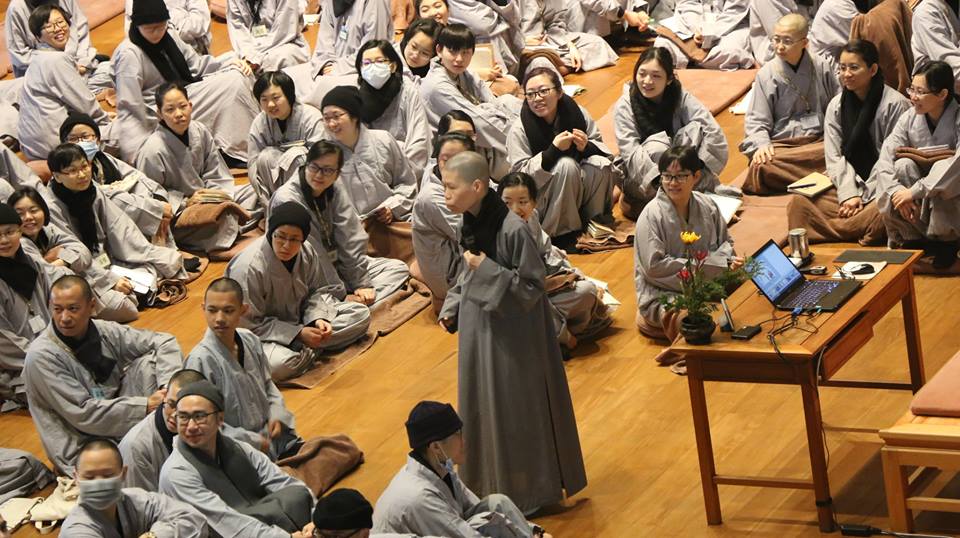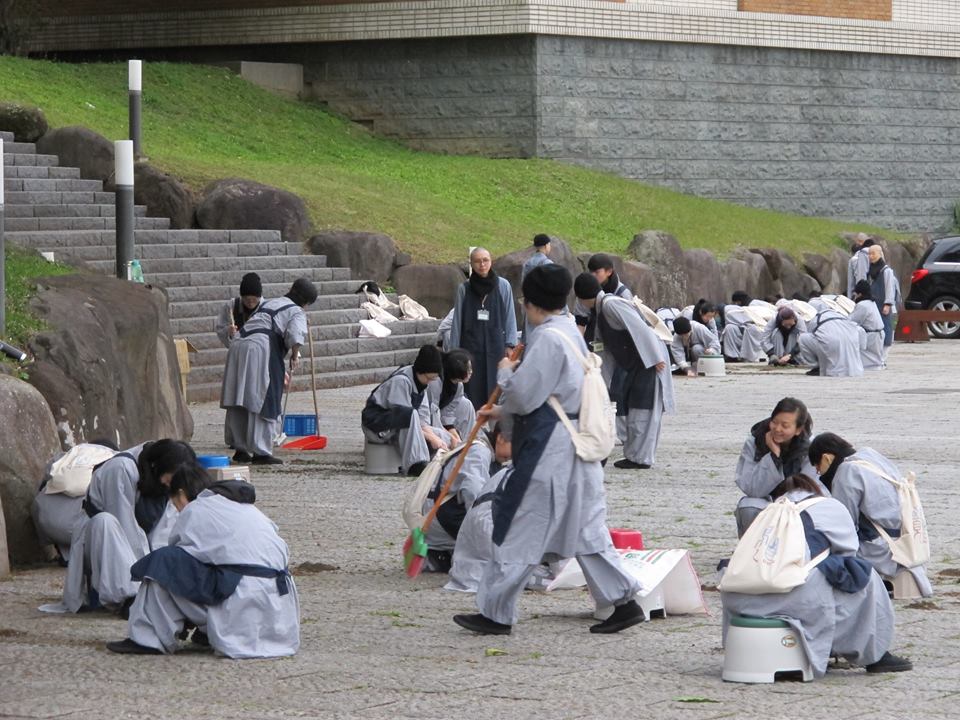My Trip to Taiwan - Taking Awakening Camp and Bodhisattva Precepts

In the beginning of 2017, I visited Taiwan, and I spent over three weeks at the Dharma Drum Mountain (DDM) Jinshan headquarters at which I participated in the eleven-day Awakening Camp (the Camp), volunteered at the DDM Sangha University, and received the Lay Bodhisattva Precepts. During the past several months, I have been reflecting on my experience in Taiwan and applying many life-changing teachings to my daily life. The Camp and the Bodhisattva Precepts Ceremony at the DDM offered me experience and knowledge that helped me to become a more mindful and kind person.
Non-attachment
The Awakening Camp gave me an opportunity to live a much simpler life. I had less need to define myself through attaching my self-worth and self-esteem to my environment, and I was thereby able to minimize the sense of self. Many of us have had the experience of going to a summer camp to play sports, explore nature, or learn about art and culture. Some of these camps promote a sense of group membership through activities such as group cheering; they also develop a sense of othering, a feeling of self-pride, and a love of personal gain. The Awakening Camp was different; it assisted its participants to seek the purpose of their lives from within themselves, while expanding their capacity to care and be insightful. During the camp, we had no access to the internet, news outlets, and telecommunication devices. Spending my time with no means to gain affirmation and sense of importance through social media likes, @s and replies, emails and phone calls, my life became simpler and less stressful. Once I could be calm and had less need to look for stimulations outwardly, I was able to be more self-aware; thus, I realized that attachment had caused me a lot of pain, frustration, and disappointment. Later, I identified that many conflicts in my life came from the fact that I was strongly attached to my beliefs and values. Because of this attachment, I perceived any disagreements or disapproval of my beliefs and values as an attack on me as a person. Letting go those attachment and assumptions, I found a less self-centered self who can love more.
Dissolving oneself

Both the Camp and the Lay Bodhisattva Precepts reminded me that restraining one’s sense of self is the ultimate empowerment and self-growth. Being free from attachment to the concept of self is another form of non-attachment; it is non-self. Like many others, I had struggled with maintaining a sense of empowerment while dissolving the self. Most of the time, empowerment implies the ability to be self-aware, to give self-love, be resilient, etc. When we develop a strong sense of self through the dualistic understanding of “me” vs. others, we form the concepts of objectivity and subjectivity; we gain a sophisticated level of ability to assess, we learn to categorize, analyze this material world. I believe there is more to the empowerment I just described. After finding who we are, we search even deeper and ask who we really are. Then, we let go this so-called empowered self and try to dissolve this “self.” A state of non-self frees us from being self-conscious, being judgmental, and having boundaries. A state of non-self is the ultimate empowerment. Volunteers and monastics at DDM showed us the way to put non-self into practice. Every step we took, there were many of them supporting us, and making sure our needs were met.
Freedom
Receiving the Lay Bodhisattva Precepts and the Ten Ordained Precepts at the end of the Camp were meaningful to me; for me, they signified the beginning of my Bodhisattva Path. Today, I also see that taking precepts are liberating. In fact, liberation can only be obtained through precepts because they aim to free their receivers from greed, anger, and ignorance. The ultimate freedom is stopping being trapped by our perceptions of the past, the current and the future, as well as seeing that the three are one. It means that the freedom to travel, to own, to speak, etc. are contextual and subject to cultural, social, and political circumstances. Often when we talk about freedom, what we really do is describe our privileges, rights, opportunities and accessibilities. Precepts that I took at DDM taught me to look beyond superficiality and be loving and kind regardless. One has to let go of one’s self and desire; otherwise, following The Three Cumulative Pure Precepts, Ten Virtuous Precepts, and Ten Inexhaustible Precepts will be a daily struggle. The level of freedom that is obtained from precepts, concentration, and wisdom depends on our capacity to cultivate our Bodhi-mind. This kind of freedom brings peace to us despite the outside environment.
Loving-kindness
The Camp and the Lay Bodhisattva Precepts have taught me to be more compassionate through repentance. It is one of many ways to dissolve one’s socially constructed self; as well, it is one of the first steps that brings loving-kindness into practice. Some may wonder whether dissolving the self is the prerequisite of being compassionate. I think the Lay Bodhisattva Precepts told us the answer is no, because it taught me that when we take the initiative to vow to cultivate the Bodhi-mind, we start the journey of being compassionate and wise regardless how self-centered we are; thus, it is called for us to practice compassion and grow it through practice. During the transmission of the precepts to the spirit realm, the congregation invited hungry ghosts and hell-beings to receive the precepts. This action demonstrated that being compassionate does not happen at a perfect moment after we have dissolved the sense of self; being compassionate is an art in progress and requires consistent improvement just like dissolving the self.
Letting go of the attachment to both the inner and outer worlds, and practicing precepts to obtain liberation are two gifts that I have received from the Awakening Camp and the Lay Bodhisattva Precepts. It seems that Dharma talks and sutras make more sense now after experiencing the monastic lifestyle. Concepts such as impermanence, non-self, nonattachment, and cause and condition help to mold me into someone who is more self-aware and accepting, and better able to cultivate changes in life with a sense of welcome and calmness.